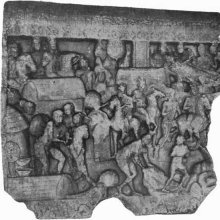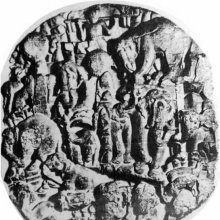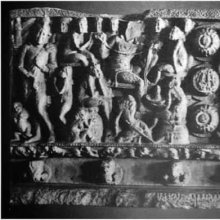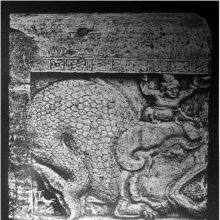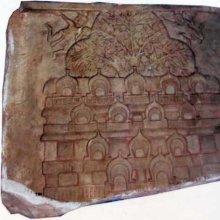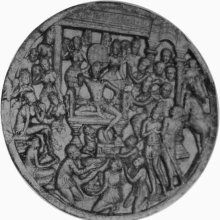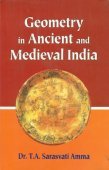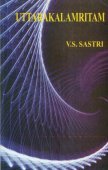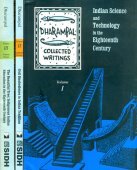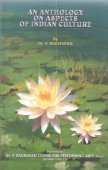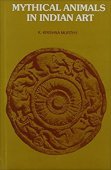Madra, Madrā: 19 definitions
Introduction:
Madra means something in Hinduism, Sanskrit, the history of ancient India, Hindi. If you want to know the exact meaning, history, etymology or English translation of this term then check out the descriptions on this page. Add your comment or reference to a book if you want to contribute to this summary article.
Images (photo gallery)
(+35 more images available)
In Hinduism
Purana and Itihasa (epic history)
Source: archive.org: Puranic Encyclopedia1) Madrā (मद्रा).—One of the ten wives of Atrimaharṣi. Atri got of Madrā a son named Soma. (Brahmāṇḍa Purāṇa).
2) Madra (मद्र).—An ancient place of habitation in Bhārata. This is situated near the river Jhelum. Mādrī, the wife of Pāṇḍu was a princess of this place. Bhīṣma went to Madra and brought Mādrī for Pāṇḍu. (Chapter 112, Ādi Parva). At the time of Arjuna’s birth there was a voice from heaven which said, "This child will grow up and capture many countries like Madra". Aśvapati, father of Sāvitrī, was a king of Madra. Karṇa condemned Madra and Vāhīka as countries which had fallen low in virtue. (Chapter 44, Karṇa Parva).
Source: Cologne Digital Sanskrit Dictionaries: The Purana Index1) Madra (मद्र).—An ancient tribe: enlisted by Jarāsandha against the Yadus, their king went to Syamantapañcaka for the solar eclipse*
- * Matsya-purāṇa 208. 5; Bhāgavata-purāṇa X. [54 (V) 4] 82. 13.
2a) Madrā (मद्रा).—One of the ten wives of Atri: mother of Soma.*
- * Brahmāṇḍa-purāṇa III. 8. 75.
2b) A R. originating from the Vindhyas.*
- * Vāyu-purāṇa 45. 102.
2c) A daughter of Ghṛtācī and Bhadrāśva.*
- * Vāyu-purāṇa 70. 68.
2d) One of the ten daughters of Raudrāśva.*
- * Vāyu-purāṇa 99. 125.
Madra (मद्र) is a name mentioned in the Mahābhārata (cf. II.29.13, II.31.7, II.48.13, VI.10.40, VI.112.38, VIII.4.23, VIII.17.3, VIII.23.1, VIII.23.2, VIII.30.1, VIII.30.7, VIII.30.9) and represents one of the many proper names used for people and places. Note: The Mahābhārata (mentioning Madra) is a Sanskrit epic poem consisting of 100,000 ślokas (metrical verses) and is over 2000 years old.

The Purana (पुराण, purāṇas) refers to Sanskrit literature preserving ancient India’s vast cultural history, including historical legends, religious ceremonies, various arts and sciences. The eighteen mahapuranas total over 400,000 shlokas (metrical couplets) and date to at least several centuries BCE.
Natyashastra (theatrics and dramaturgy)
Source: Wisdom Library: Nāṭya-śāstraMadra (मद्र) is the name of a country pertaining to the Pāñcālī (Pāñcālamadhyamā) local usage (pravṛtti) according to the Nāṭyaśāstra chapter 14. These pravṛttis provide information regarding costumes, languages, and manners in different countries of the world. It is mentioned that this local usage (adopted by these countries) depends on the grand style (sāttvatī) and the violent style (ārabhaṭī).

Natyashastra (नाट्यशास्त्र, nāṭyaśāstra) refers to both the ancient Indian tradition (shastra) of performing arts, (natya—theatrics, drama, dance, music), as well as the name of a Sanskrit work dealing with these subjects. It also teaches the rules for composing Dramatic plays (nataka), construction and performance of Theater, and Poetic works (kavya).
Jyotisha (astronomy and astrology)
Source: Wisdom Library: Brihat Samhita by VarahamihiraMadra (मद्र) refers to a country [identified with Madras (a country to the north-west of Hindustan proper)], belonging to “Paścimottara (north-western division)” classified under the constellations of Uttarāṣāḍha, Śravaṇa and Dhaniṣṭhā, according to the system of Kūrmavibhāga, according to the Bṛhatsaṃhitā (chapter 14), an encyclopedic Sanskrit work written by Varāhamihira mainly focusing on the science of ancient Indian astronomy astronomy (Jyotiṣa).—Accordingly, “The countries of the Earth beginning from the centre of Bhāratavarṣa and going round the east, south-east, south, etc., are divided into 9 divisions corresponding to the 27 lunar asterisms at the rate of 3 for each division and beginning from Kṛttikā. The constellations of Uttarāṣāḍha, Śravaṇa and Dhaniṣṭhā represent the north-western division consisting of [i.e., Madra] [...]”.

Jyotisha (ज्योतिष, jyotiṣa or jyotish) refers to ‘astronomy’ or “Vedic astrology” and represents the fifth of the six Vedangas (additional sciences to be studied along with the Vedas). Jyotisha concerns itself with the study and prediction of the movements of celestial bodies, in order to calculate the auspicious time for rituals and ceremonies.
General definition (in Hinduism)
Source: archive.org: Indian Historical Quarterly Vol. 7Madra (मद्र) is the name of a country classified as both Hādi and Kādi (both types of Tantrik division), according to the 13th century Sammoha-tantra (fol. 7).—There are ample evidences to prove that the zone of heterodox Tantras went far beyond the natural limits of India. [...] The zones in the Sammoha-tantra [viz., Madra] are here fixed according to two different Tantrik modes, known as Kādi and Hādi.
India history and geography
Source: archive.org: Personal and geographical names in the Gupta inscriptionsMadra (मद्र) is an example of a name based on a trial heritage mentioned in the Gupta inscriptions. The Gupta empire (r. 3rd-century CE), founded by Śrī Gupta, covered much of ancient India and embraced the Dharmic religions such as Hinduism, Buddhism and Jainism. Derivation of personal names (e.g., Madra) during the rule of the Guptas followed patterns such as tribes, places, rivers and mountains.
Source: archive.org: Nilamata Purana: a cultural and literary study (history)Madra (मद्र) is the name of a tribe mentioned as inhabiting the region around ancient Kaśmīra (Kashmir valley) according to the Nīlamatapurāṇa.—Famous since the Vedic times, the Madras were, according to the Bṛhadāraṇyakopaniṣad, well versed in sacrificial studies. They were a corporation of warriors and enjoyed the title of rājas. In the Mahābhārata they are condemned for their close relations with the Vāhīkas. Their country Madra which finds mention in the Aṣṭādhyāyī, the Mahābhāṣya and the Jātakas, corresponds to the modern Sialkot (ancient Śākala) and the surrounding regions between the Irāvatī and the Candrabhāgā.
Source: Ancient Buddhist Texts: Geography of Early BuddhismMadra (मद्र) (or Madda in Pali) is the name of an ancient kingdom situated in Uttarāpatha (Northern District) of ancient India, as recorded in the Pāli Buddhist texts (detailing the geography of ancient India as it was known in to Early Buddhism).—The Madras had a monarchical constitution and their territory may be said to correspond roughly to Sialkot and its adjacent districts which were known as late as the 18th century as the Madradeśa. That Sāgala or Sākala (modern Sialkot in the Punjab) was the capital of the Madra country is also attested to by the Mahābhārata, as also by several Jātakas (cf. the Kāḷiṅgabodhi Jātaka and the Kusa Jātaka).

The history of India traces the identification of countries, villages, towns and other regions of India, as well as mythology, zoology, royal dynasties, rulers, tribes, local festivities and traditions and regional languages. Ancient India enjoyed religious freedom and encourages the path of Dharma, a concept common to Buddhism, Hinduism, and Jainism.
Languages of India and abroad
Sanskrit dictionary
Source: DDSA: The practical Sanskrit-English dictionaryMadra (मद्र).—[mad-rak Uṇādi-sūtra 2.13]
1) Name of a country; विराटपाण्ड्ययोर्मध्ये पूर्वदक्षक्रमेण च । मद्रदेशः समाख्यातः (virāṭapāṇḍyayormadhye pūrvadakṣakrameṇa ca | madradeśaḥ samākhyātaḥ) ......
2) A ruler of that country.
-drāḥ (pl.) The inhabitants of Madra.
-dram Joy, happiness. (madrākṛ = bhadrākṛ 'to shave or shear').
Derivable forms: madraḥ (मद्रः).
Source: Cologne Digital Sanskrit Dictionaries: Shabda-Sagara Sanskrit-English DictionaryMadra (मद्र).—m.
(-draḥ) 1. Joy, delight. 2. A country enumerated amongst those to the N. W. of Hindustan proper. 3. A sovereign of that country. f.
(-drā) The name of a river. E. madi to be delighted, Unadi aff. rak .
Source: Cologne Digital Sanskrit Dictionaries: Benfey Sanskrit-English DictionaryMadra (मद्र).—[mad + ra], I. m. 1. Joy. 2. The name of a country, [Sāvitryupākhyāna] 1, 2. 3. A sovereign of that country. Ii. f. rā, The name of a river.
Source: Cologne Digital Sanskrit Dictionaries: Cappeller Sanskrit-English DictionaryMadra (मद्र).—[masculine] [plural] [Name] of a people, sgl. the country or a prince of the [Middle]; *[neuter] joy or hail to ([genetive] or [dative])!
Source: Cologne Digital Sanskrit Dictionaries: Monier-Williams Sanskrit-English Dictionary1) Madra (मद्र):—[from mad] a m. a country to the north-west of Hindūstan proper, or a king ([plural] the people) of this c°, [Śatapatha-brāhmaṇa] etc. etc.
2) [v.s. ...] Name of a son of Śibi (the progenitor of the Madras), [Purāṇa]
3) Madrā (मद्रा):—[from madra > mad] f. Name of a daughter of Raudrāśva, [Harivaṃśa]
4) [v.s. ...] (in music) a personification of the first Mūrchanā in the Gāndhāra-grāma
5) Madra (मद्र):—[from mad] n. joy, happiness (madraṃ tasya or tasmai, ‘joy to him!’ cf. n. of bhadra), [Pāṇini 2-3, 73.]
6) b etc. See [column]1.
7) Mādra (माद्र):—m. ([from] madra, of which it is also the Vṛddhi form in [compound]) a king of the Madras, [Patañjali]
Source: Cologne Digital Sanskrit Dictionaries: Yates Sanskrit-English DictionaryMadra (मद्र):—(draḥ) 1. m. Joy; N. W. country; its king. f. Name of a river.
[Sanskrit to German]
Sanskrit, also spelled संस्कृतम् (saṃskṛtam), is an ancient language of India commonly seen as the grandmother of the Indo-European language family (even English!). Closely allied with Prakrit and Pali, Sanskrit is more exhaustive in both grammar and terms and has the most extensive collection of literature in the world, greatly surpassing its sister-languages Greek and Latin.
Hindi dictionary
Source: DDSA: A practical Hindi-English dictionaryMadra in Hindi refers in English to:—(nm) a seal; stamp; money, coin; countenance, demeanour; mien, pose, posture; ~[kshara] type; ~[lekha] legend; ~[vijnana/shastra] numismatics; ~[sphiti] inflation..—madra (मुद्रा) is alternatively transliterated as Mudrā.
...
Kannada-English dictionary
Source: Alar: Kannada-English corpusMadra (ಮದ್ರ):—
1) [noun] great joy or pleasure; delight.
2) [noun] name of an old country in the north-west part of India.
--- OR ---
Mādra (ಮಾದ್ರ):—[adjective] of or relating to the arch. country Madra, in the northwestern part of India.
Kannada is a Dravidian language (as opposed to the Indo-European language family) mainly spoken in the southwestern region of India.
See also (Relevant definitions)
Starts with (+37): Madrabaheya, Madrabala, Madrachi, Madradesha, Madragara, Madragari, Madrahrada, Madraja, Madrajani, Madraka, Madrakadhama, Madrakagiti, Madrakalanga, Madrakapati, Madrakar, Madrakara, Madrakri, Madrakula, Madrakulaka, Madramkara.
Ends with: Alimadra, Aparamadra, Paurvamadra, Purvamadra, Sumadra, Uttaramadra.
Full-text (+2081): Madraka, Madrakara, Madri, Madrapa, Madravati, Madranagara, Madrasuta, Madrika, Madramkara, Madranabha, Purvamadra, Madrakulaka, Sumadram, Uttaramadra, Madrakula, Madrarma, Madraraja, Madreshvara, Sindhuvirya, Madresha.
Relevant text
Search found 146 books and stories containing Madra, Madrā, Mādra; (plurals include: Madras, Madrās, Mādras). You can also click to the full overview containing English textual excerpts. Below are direct links for the most relevant articles:
Mahabharata (English) (by Kisari Mohan Ganguli)
Yoga Vasistha [English], Volume 1-4 (by Vihari-Lala Mitra)
Chapter VIII - Transmigrations of sukra < [Book IV - Sthiti prakarana (sthiti prakarana)]
Chapter CXIV - Description of the prospects all around < [Book VII - Nirvana prakarana part 2 (nirvana prakarana)]
The Markandeya Purana (by Frederick Eden Pargiter)
Canto CXXXI - Marutta’s exploits (concluded)
Canto LVII - The Geography of Bhārata
The Nilamata Purana (by Dr. Ved Kumari)
Mahavamsa (by Wilhelm Geiger)
List of Mahabharata tribes (by Laxman Burdak)
Related products
(+1 more products available)
